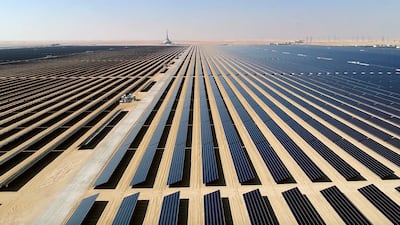The Middle East and North Africa region has the resources and vision to unlock huge economic potential as the world remains focused on the transition to a lower-carbon economy, according to Dr Sultan Al Jaber, Minister of Industry and Advanced Technology.
“The energy transition to a lower-carbon future represents a huge economic opportunity that we must seize using every lever available,” Dr Al Jaber, who is also managing director and group chief executive of Abu Dhabi National Oil Company, said on Thursday.
He was speaking at a ministerial dialogue on Mena clean energy transitions and economic resilience organised by the International Energy Agency and Oman’s ministry of energy and minerals.
The region is blessed with abundant sunlight and high-speed winds as well as oil, which will “still be needed for many decades to come”, as the world pivots towards energy transition, he said.
“These natural attributes across both conventional and renewable energy add up to a major competitive advantage for our region. It is an advantage we must capitalise on together," Dr Al Jaber added.
The need to build stronger and greener economies across the globe has come into sharp focus since the Covid-19 pandemic. Countries are investing heavily in meeting their energy needs from renewable sources and are pushing to develop new technologies to cut emissions to meet their 2015 Paris Climate Accord obligations.
In the Mena region, several countries including the UAE, Saudi Arabia, Jordan, Egypt, Morocco and Oman have developed renewable energy projects to boost their power generation capacity, with Abu Dhabi clean energy company Masdar playing a key role in numerous projects.
The UAE, Opec's third-largest oil producer, is looking to increase the share of clean energy to 44 per cent by 2050 and plans to invest Dh600 billion ($163bn) by 2050 to expand its renewable energy capacity.
Abu Dhabi, which accounts for a bulk of the UAE's oil production, is also developing more renewable energy projects. The emirate is building a solar plant at Al Dhafra with a total capacity of 2 gigawatts, as part of the UAE's efforts to boost the ratio of clean power in its energy mix.
Dubai is building the world’s largest solar energy park in an effort to reduce reliance on natural gas and diversify its power sources. The Mohammed bin Rashid Solar Park is expected to generate 5,000 megawatt of electricity by 2030 and is estimated to drive up Dh50bn in investments.
Despite new projects, the total installed renewable energy capacity in the region represents only 1 per cent of the world’s total renewable energy, “which means there is enormous room to grow”, Dr Al Jaber said.
The Mena region is also well-positioned to take advantage of promising new low and zero-carbon energies such as blue and green hydrogen, he added.
The UAE is vying to position itself as a hub for hydrogen exports and further explore growth potential of the clean fuel as part of its push into the emerging hydrogen economy.
In January, Adnoc, Mubadala and ADQ formed an alliance to develop a hydrogen economy in the UAE, focusing on low-carbon green and blue hydrogen as part of the country’s continued energy diversification efforts. Last month, Adnoc sold a shipment of blue ammonia to Japanese company Inpex.
“While the global hydrogen market is still at a very early stage, our region is perfectly placed to lead it," Dr Al Jaber said.
The UAE has offered to host the UN Climate Change Conference in 2023 and "we would fully leverage this platform to reinforce the case that progressive climate action can create lasting economic prosperity for our region and beyond", he added.


